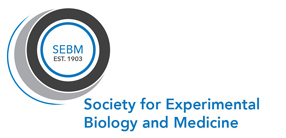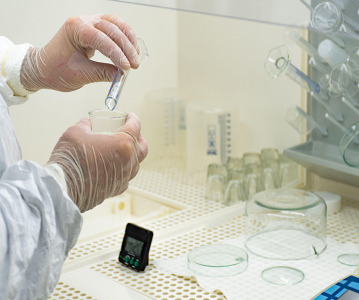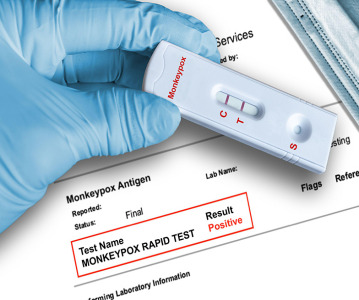A plant-based delivery system for anti-cancer drugs

Study demonstrates that a complex consisting of tobacco mosaic virus and vcMMAE can kill cancer cells.
An article published in Experimental Biology and Medicine (Volume 242, Issue 14, August 2017) reports that a plant virus-based system can be used to deliver anti-cancer drugs. The study, led by Dr Nicole Steinmetz in the Department of Biomedical Engineering at the Case Western Reserve University Schools of Engineering and Medicine in Cleveland, OH, demonstrates that a complex consisting of tobacco mosaic virus (TMV) and vcMMAE, a first-line chemotherapy agent for the treatment of lymphoma, can kill cancer cells.
Over 800,000 Americans are living with or in remission from lymphoma, a cancer of the lymph system. Non-Hodgkin's lymphoma (NHL) is the most common type of lymphoma, and patients with this disease have a poor prognosis. The first-line treatment strategy for NHL is chemotherapy. However, this approach is associated with off-target side effects. Nanocarriers are being developed to improve drug delivery and minimize off-target effects associated with anti-cancer drugs. However, the utility of many of these systems in drug delivery may be limited by their spherical shape. Elongated nanomaterials may be superior to their spherical counterparts due to increased target cell interactions and decreased immune cell uptake. Nonetheless, the synthesis of highly uniform elongated nanomaterials is challenging,
The current study used a naturally derived assembly containing components of the plant virus TMV to overcome issues associated with synthetic systems. TMV was bioconjugated with a valine-citrulline monomethyl auristatin E (vcMMAE) pro-drug used in treating NHL. The resulting TMVvcMMAE complex entered NHL cancer cells where it was cleaved to release the active drug and killed the cancer cells. Dr Steinmetz said: "Each platform technology offers unique advantages for drug delivery; plant virus-based nanotechnologies can be manufactured in high yields through molecular farming in plants, the protein-based materials are stable in biological media and the biocompatible nanoscale scaffold offers an unparalleled opportunity for engineering allowing the introduction of various medical cargo. While still early in their development stages, plant virus-based drug delivery systems offer an intriguing platform technology for next-generation drug delivery."
Dr Steven R. Goodman, Editor-in-Chief of Experimental Biology and Medicine, said, "Steinmetz and colleagues have utilized the plant virus TMV as a platform for delivering a valine-citrulline monomethyl auristatin E (vcMMAE) pro-drug into an in vitro model of human B-cell NHL. They observed cell uptake, endolysosomal location and possible cleavage of the prodrug, and cell killing. These studies provide the impetus for further testing of this plant virus drug delivery system for cancer treatment."
Related News
-
News CPHI Frankfurt 2022: Innovator Interview – DSM Biomedical
At CPHI Frankfurt we spoke to Anne-Cecile Bayne, Global Science & Innovation Lead Pharma and Medical Nutrition, and Marc Hendriks, Vice President Strategy & Business Development, on their expertise in nitrosamines and business strategy at DSM Biomedica... -
News New WHO health emergency guidelines expect full transparency from Big Pharma
The WHO are proposing a new set of pandemic guidelines to set out how future global health crises should be handled. -
News Magic mushrooms could be used to treat mental health conditions
A compound found in magic mushrooms, psilocybin, could be used to treat mental health conditions and help patients suffering with severe depression, as shown by the results of the largest study of its kind to date. -
News UK-based partnership to launch DETERMINE study into rare cancer research
UK-based CRO Quanticate is set to partner with Cancer Research UK for the launch of the DETERMINE study focused on testing a range of existing and approved drugs and therapies on rare cancers. -
News FDA approves Thermo Fisher blood tests for wheat and sesame allergies
Both tests have been approved by the US regulator for in vitro diagnostic use -
News QIAGEN launches world’s first syndromic test for monkeypox
The test can distinguish between monkeypox and other diseases that cause similar symptoms. -
News Monkeypox Update: Vaccine shortage, sewage surveillance and global testing
As concern over the monkeypox outbreak continues to rise, we take a look at major developments from the first week of August. -
News CPHI Podcast Series: The importance of novel excipients for innovative drug development
The latest episode in the CPHI Podcast Series dives into the world of novel excipients and explores their importance for innovative drug development.
Position your company at the heart of the global Pharma industry with a CPHI Online membership
-
Your products and solutions visible to thousands of visitors within the largest Pharma marketplace
-
Generate high-quality, engaged leads for your business, all year round
-
Promote your business as the industry’s thought-leader by hosting your reports, brochures and videos within your profile
-
Your company’s profile boosted at all participating CPHI events
-
An easy-to-use platform with a detailed dashboard showing your leads and performance


.png)




